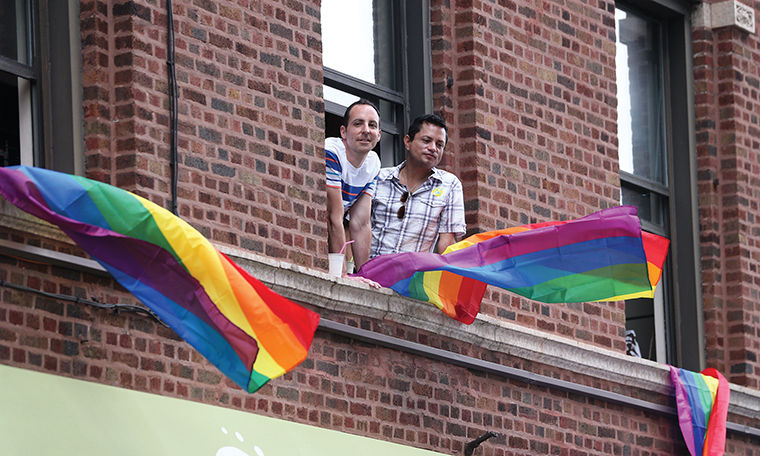Pride Parade may see its final year in Lakeview
Two men watch from the window of an apartment as Jennifer Hudson performs at Chicago Pride Fest in the Lakeview neighborhood of Chicago, Ill., on Saturday, June 21, 2014. (Chris Sweda/Chicago Tribune/MCT)
May 11, 2015
The 46th annual Chicago Pride Parade, scheduled for June 28, may leave its usual Lakeview location after this year. The mayor’s office, Alderman Tom Tunney (44th Ward) and Alderman James Cappleman (46th Ward) have recently been discussing the future of the parade, said Jamey Lundblad, director of Marketing and Communications for the Chicago Department of Cultural Affairs and Special Events, in a May 7 emailed statement.
Changes to this year’s parade include a stricter public safety plan, enhanced enforcement against drinking in public and overall improvements to parade operations, Lundblad said.
Unless the parade’s impact on area residents’ quality of life is seriously minimized this year, Lundblad said an advisory group will be assembled to make recommendations to relocate the parade to a different neighborhood.
Bernard Cherkasov, CEO of Equality Illinois, an organization that works to advance equal treatment and social justice through education advocacy and protection of the rights of the LGBTQ community, said he has heard sporadic reports about the parade moving out of the traditional LGBTQ-friendly neighborhoods.
“[The parade] started in the LGBT neighborhoods to celebrate LGBT equality, LGBT community and LGBT neighborhoods and [that is where] it belongs,” Cherkasov said. “Boystown, Uptown and An- dersonville are the [integral] parts of our community, and the parade should stay there.”
Cherkasov said the parade celebrates the life of the LGBTQ community, its diversity and the progress the community has made throughout recent decades in its fight for equality.
“People come [from all over] to Boystown and Uptown for the very first time, they support these small businesses,” Cherkasov said. “The parade really contributes in a year-round way economic-wise for these wards as well.”
Peter Johnson, director of public relations at the Center on Halsted, 3656 N. Halsted St., an LGBTQ community center in Chicago, said that it would send a different message if the parade moved out of Lakeview next year.
“The parade in Lakeview really engages a lot of the local community partners and a lot of the businesses in the area that are LGBT-owned and LGBT-centric,” Johnson said. “By moving [the parade] downtown, you would see a different level of engagement from those organizations.”
Along with the LGBTQ organizations that oppose the parade’s relocation, members of the LGBTQ community have spoken out against a potential relocation as well.
Jake Taylor, a sophomore photography major at Columbia and a Boystown resident, said moving the parade downtown next year will not mean better behavior at the parade.
“I think [St. Patrick’s Day] is a straight equivalent to Pride,” Taylor said. “They moved [St. Patrick’s Day] downtown and look what still happens—look at everyone in Wrigleyville who gets arrested, look at everyone in Lakeview who gets arrested. That night is crazy [and] the CTA is [also] crazy. If we move it downtown, people are going to [be drunk] on the CTA and will have to use other forms of transportation, [which will] cause more accidents.”
Taylor said he does not plan to change his Pride Parade tradition if the parade moves next year.
“I am still going to stay on Halsted and celebrate,” Taylor said. “The number of people from the LGBT community who have gone to the parade has stayed the same, but the number of people not in the community has increased.”
Taylor said there will be celebrations no matter where the parade is located because the parade is heavily publicized.
“People who chose to live on Halsted and areas where the parade takes place need to realize that the parade comes here every year, so they should be aware of those consequences,” Taylor said.
Jessica Paul, a member of Columbia’s Common Ground, a student organization that allows LGBTQ students to express themselves freely, said moving the parade could cause more conflict for people of the LGBTQ community.
“The area they move it to could be less accepting and more homophobic,” Paul said. “Boystown is the area for decades where people can express their sexuality safely.”
Paul said she acknowledges that there have been increasing safety concerns related to the parade. She said the public should not focus on where it is located but should instead focus on supporting the parade.
“There should be more security and police involved, not to make people feel unsafe by harassing them, but to make people feel more safe by keeping the parade under control,” Paul said.








